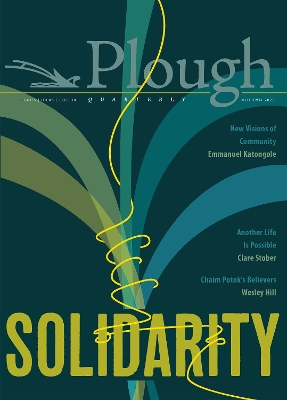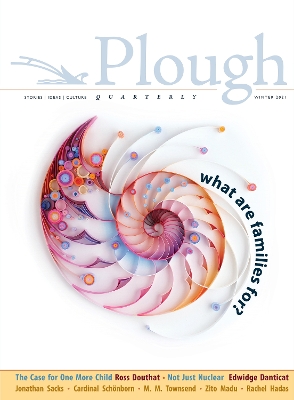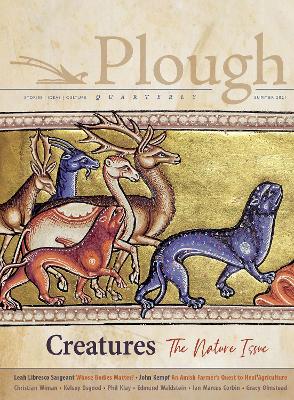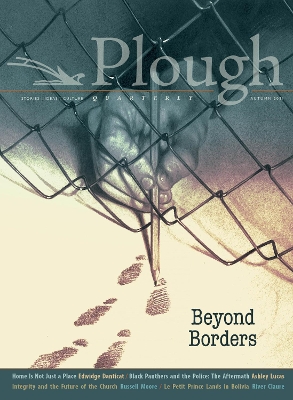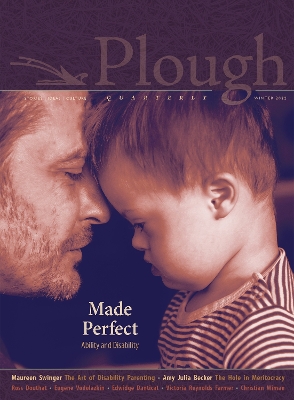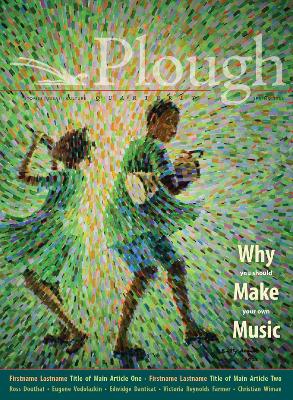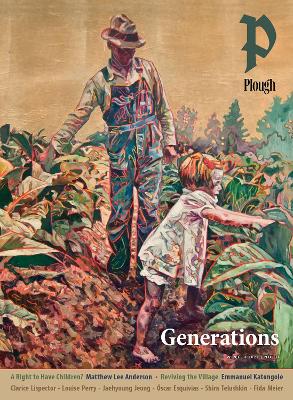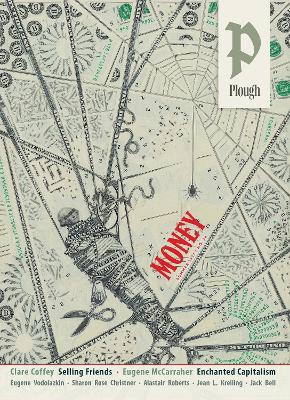Plough Quarterly
8 total works
Plough Quarterly No. 25 - Solidarity
by James Gurney, Emmanuel Katongole, Rabbi Jonathan Sacks, Sally Thomas, Wesley Hill, Karen Swallow Prior, Jacaueline C Rivers, Noah Van Niel, Ashley Lucas, and James Crews
Whatever else they do, pandemics show us we are not alone. Covid-19 is proof that, yes, there is such a thing as society; the disease has spread precisely because we aren't autonomous individuals disconnected from each other, but rather all belong to one great body of humanity. The pain inflicted by the pandemic is far from equally distributed. Yet it reveals ever more clearly how much we all depend on one another, and how urgently necessary it is for us to bear one another's burdens.
It's a good time, then, to talk about solidarity. The more so because it's a theme that's also raised by this year's other major development, the international protests for racial justice following George Floyd's death. The protests, too, raised the question of solidarity in guilt, even guilt across generations. By taking up our common guilt with all humanity, we come into solidarity with the one who bears it and redeems it all. In Christ, sins are forgiven, guilt abolished, and a new way of living together becomes possible. This solidarity in forgiveness gives rise to a life of love.
This issue of Plough explores what solidarity means, and what it looks like to live it out today, whether in Uganda, Bolivia, or South Korea, in an urban church, a Bruderhof, or a convent.
Plough Quarterly No. 26 - What Are Families For?
by Ross Douthat, Edwidge Danticat, Sarah C. Williams, Rabbi Jonathan Sacks, Cardinal Christoph Schoenborn, Leah Libresco Sargeant, Gina Dalfonzo, Zito Madu, Norann Voll, and Noah Van Niel
Story 1: Families are in crisis, and the cause is moral breakdown. We urgently need a deep renewal of our family culture, supported by public policies that strengthen traditional marriage and encourage childbearing.
Story 2: Families are in crisis, and the cause is capitalism. We need structural changes in society so that all families can flourish: parental leave, guaranteed healthcare, flexible work hours for parents, restorative justice.
What if both these stories are true? This issue of Plough reflects on what a family is and what it is for, so that the transformations needed to solve the crisis of the family start from a firm basis, not a nostalgic ideal or progressive theorizing. As always, we take as a starting point the teachings of Jesus. It turns out his idea of family values might not be what people think. He calls us to extend our natural love for our biological family to a vast new throng of siblings - a family of many ethnicities and cultures that includes the widowed, the unmarried, the outsider, and the stranger.
In this issue:
- Ross Douthat asks what is stopping people from having the one more child they desire.
- Edwidge Danticat says families are not nuclear.
- Gina Dalfonzo reveals what singles know best about the church as family.
- Norann Voll remembers a Jewish woman who escaped the Holocaust and married a German.
- W. Bradford Wilcox and Alysse ElHage report on how the Covid pandemic has impacted the family.
- Noah Van Niel asks whether masculinity is OK anymore.
- Cardinal Christoph Schoenborn reflects the burden of family history, celibacy, and monument toppling.
- Sarah C. Williams pinpoints the source of feminist pioneer Josephine Butler's daring.
- Rabbi Jonathan Sacks begins the story of marriage 385 million years ago in a lake in Scotland.
- Zito Madu recalls how his father's amazing storytelling saved the past from oblivion.
You'll also find:
- M. M. Townsend on what Louisa May Alcott and Simone de Beauvoir had in common
- A special announcement about Plough's new poetry contest: the Rhina Espaillat Poetry Award
- A reading from G. K. Chesterton
- Two new poems by Rachel Hadas
- Reviews of Eric Edstrom's Un-American, Maya Schenwar and Victoria Law's Prison by Any Other Name, Brian Doyle's One Long River of Song, and Martin Caparros's Hunger
Plough Quarterly features stories, ideas, and culture for people eager to put their faith into action. Each issue brings you in-depth articles, interviews, poetry, book reviews, and art to help you put Jesus' message into practice and find common cause with others.
Plough Quarterly No. 28 - Creatures
by Adam Nicolson, Gracy Olmstead, Christian Wiman, Kelsey Osgood, John Kempf, Leah Libresco Sargeant, Ian Marcus Corbin, Ivan Bernal Marin, Phil Klay, and Edmund Waldstein
"All things bright and beautiful, all creatures great and small, all things wise and wonderful, the Lord God made them all," says a well-known hymn. This issue of Plough celebrates the creatures of our planet - plant, animal, and human - and the implications of humankind's relationship to nature.
But if nature can be read as a book that reveals the wisdom of its Creator, it also reveals things less lovely than stars and singing birds - a world of desperate competition for survival, mass extinctions, and deadly viruses. Is such a world a convincing argument for the Creator's goodness? Turns out Christians and skeptics alike have been asking such questions since long before Darwin added a twist.
Are we moderns out of practice at reading the book of nature? And if we forget how, will we fail to read human nature as well - what rights or purposes our Creator may have endowed us with? What then is there to limit the bounds of technological manipulation of humankind?
This issue of Plough explores these and other fascinating questions about the natural world and our place in it.
In this issue:
- Sussex farmer Adam Nicholson evokes centuries of handwork that shaped the landscape of the Weald.
- Gracy Olmstead revisits the land her forebears farmed in Idaho.
- Ian Marcus Corbin tries walking phoneless to better note the beauty of the natural world.
- Amish farmer John Kempf, a leader in regenerative agriculture, foresees a healthier future for farming.
- Leah Libresco Sargeant offers a feminist critique of society's war on women's bodies.
- Ivan Bernal Marin visits Panama City's traditional fishermen.
- Maureen Swinger recalls to triumphs of second grade in forest school.
- Edmund Waldstein questions head transplants and the limits of medical science.
- Kelsey Osgood says it's natural to fear death, and to transcend that fear through faith.
- Tim Maendel lifts the veil on urban beekeeping along the Manhattan skyline.
You'll also find:
- An essay by Christian Wiman on the poetry of doubt and faith
- New poems by Alfred Nicol
- A profile of Amazon activist nun Dorothy Stang
- An appreciation of Keith Green's songs
- Insights on creation from Blaise Pascal, Julian of Norwich, Francis of Assisi, Mechthild of Magdeburg, Christopher Smart, Augustine of Hippo, The Book of Job, and Sadhu Sundar Singh
- Reviews of The Opening of the American Mind, and Kazuo Ishiguro's Klara and the Sun
Plough Quarterly features stories, ideas, and culture for people eager to put their faith into action. Each issue brings you in-depth articles, interviews, poetry, book reviews, and art to help you put Jesus' message into practice and find common cause with others.
Plough Quarterly No. 29 - Beyond Borders
by Edwidge Danticat, Russell Moore, Ashley Lucas, Stephanie Saldana, River Claure, Bermudez Ramos, Ann Thomas, Simeon Wiehler, and Yaniv Sagee
Can we move beyond borders that divide us without losing our identity?
Over the past decade, the yearning for rootedness, for being part of a story bigger than oneself, has flared up as a cultural force to be reckoned with. There's much to affirm in this desire to belong to a people. That means pride in all that is admirable in the nation to which we belong - and repentance for its historic sins.
A focus on national identity, of course, can lead to darker places. The new nationalists, who in Western countries often appeal to the memory of a Christian past, applaud when governments fortify borders to keep out people who are fleeing for their lives. (Needless to say, such actions are contrary to the Christian faith.) Is our yearning for roots doomed to lead to a heartless politics of exclusion? Does maintaining group or national identity require borders guarded with lethal violence?
The answer isn't artificial schemes for universal brotherhood, such as a universal language. Our differences are what make a community human. Might the true ground for community lie deeper even than shared nationality or language? After all, the biblical vision of humankind's ultimate future has "every tribe and language and people and nation" coming together - beyond all borders but still as themselves.
In this issue:
- Santiago Ramos describes a double homelessness immigrant children experience as outsiders in both countries.
- Ashley Lucas profiles a Black Panther imprisoned for life and looks at the impact on his family.
- Simeon Wiehler helps a museum repatriate a thousand human skulls collected by a colonialist.
- Yaniv Sagee calls Zionism back to its founding vision of a shared society with Palestinians.
- Stephanie Saldana finds the lost legendary chocolates of Damascus being crafted in Texas.
- Edwidge Danticat says storytelling builds a home that no physical separation can take away.
- Phographer River Claure reimagines Saint-Exupery's Le Petit Prince as an Aymara fairy tale.
- Ann Thomas tells of liminal experiences while helping families choose a cemetery plot.
- Russell Moore challenges the church to reclaim its integrity and staunch an exodus.
You'll also find:
- Prize-winning poems by Mhairi Owens, Susan de Sola, and Forester McClatchey
- A profile of Japanese peacemaker Toyohiko Kagawa
- Reviews of Fredrik deBoer's The Cult of Smart, Anna Neima's The Utopians, and Amor Towles's The Lincoln Highway
- Insights on following Jesus from E. Stanley Jones, Barbara Brown Taylor, Teresa of Avila, Oscar Romero, Martin Luther King Jr., Eberhard Arnold, Leonardo Boff, Meister Eckhart, C. S. Lewis, Hermas, and Dietrich Bonhoeffer
Plough Quarterly features stories, ideas, and culture for people eager to put their faith into action. Each issue brings you in-depth articles, interviews, poetry, book reviews, and art to help you put Jesus' message into practice and find common cause with others.
Plough Quarterly No. 30 - Made Perfect
by Molly McCully Brown, Victoria Reynolds Farmer, Edwidge Danticat, Stephanie Saldana, Kelsey Osgood, Christian Wiman, Amy Julia Becker, Ross Douthat, Eugene Vodolazkin, and Sarah C. Williams
The ancient Greek ideal linked physical wholeness to moral wholeness - the virtuous citizen was "beautiful and good." It's an ideal that has all too often turned deadly, casting those who do not measure up as less than human. In the pre-Christian era, infants with disabilities were left on the rocks; in modern times, they have been targeted by eugenics.
Much has changed, thanks to the tenacious advocacy of the disability rights movement. Yesteryear's hellish institutions have given way to customized educational programs and assisted living centers. Public spaces have been reconfigured to improve access. Therapies and medical technology have advanced rapidly in sophistication and effectiveness. Protections for people with disabilities have been enshrined in many countries' antidiscrimination laws.
But these victories, impressive as they are, mask other realities that collide awkwardly with society's avowals of equality. Why are parents choosing to abort a baby likely to have a disability? Why does Belgian law allow for euthanasia in cases of disability, even absent a terminal diagnosis or physical pain? Why, when ventilators were in short supply during the first Covid wave, did some states list disability as a reason to deny care?
On this theme:
- Heonju Lee tells how his son with Down syndrome saved another child's life.
- Molly McCully Brown and Victoria Reynolds Farmer recount their personal experiences with disability.
- Amy Julia Becker says meritocracies fail because they value the wrong things.
- Maureen Swinger asks six mothers around the world about raising a child with disabilities.
- Joe Keiderling documents the unfinished struggle for disability rights.
- Isaac T. Soon wonders if Saint Paul's "thorn in the flesh" was a disability.
- Leah Libresco Sargeant reviews What Can a Body Do? and Making Disability Modern.
- Sarah C. Williams says testing for fetal abnormalities is not a neutral practice.
Also in the issue:
- Ross Douthat is brought low by intractable Lyme disease.
- Edwidge Danticat flees an active shooter in a packed mall.
- Eugene Vodolazkin finds comic relief at funerals, including his own father's.
- Kelsey Osgood discovers that being an Orthodox Jew is strange, even in Brooklyn.
- Christian Wiman pens three new poems.
- Susannah Black profiles Flannery O'Conner.
- Our writers review Eyal Press's Dirty Work, Steve Coll's Directorate S, and Millennial Nuns by the Daughters of Saint Paul.
Plough Quarterly features stories, ideas, and culture for people eager to apply their faith to the challenges we face. Each issue includes in-depth articles, interviews, poetry, book reviews, and art.
In many places today, a culture of singing and making music remains robust, despite pressure from the commercial music industry. Or it was until the Covid pandemic hit and we glimpsed what a world without communal music-making could be like. According to Plato, virtuous music is vital for building a virtuous community. Jewish and Christian traditions take this insight even further: good communal music shapes and builds up the people of God. So how can we choose good music and avoid the bad? The sheer ubiquity of music available for consumption - its presence as a near-constant soundtrack to our daily lives - poses a hazard. Digital music on tap is a temptation to chronic distraction of the soul, to a habit of superficiality and non-attention. Fortunately, the remedy is straightforward: spend less time consuming prepackaged tunes and more time making music. This will be doubly rewarding if done with others - singing with one's family, singing in church, playing in a string quartet, starting a regular jam session. If personal media players tend to cut us off from the physical presence of others, sharing in good music together breaks the spell of isolation and disembodiment. It builds friendship and community.
On this theme:
- Maureen Swinger's amateur choir sings Bach's Saint Matthew Passion.
- Stephen Michael Newby says Black spirituals aren't just for Black people.
- Mary Townsend finds Dolly Parton magnificent, but would Aristotle?
- Phil Christman finds catharsis in the YouTube comments of eighties songs.
- Ben Crosby says congregational singing should be unabashedly weird to visitors.
- Joseph Julian Gonzalez draws on ancient Nahua poets in his music.
- Christopher Tin explains why he weaves so many historical influences into his music. - Seven musicians talk about making your own music in schools, churches, prisons, backyards, or children's bedrooms: Nathan Schram, Esther Keiderling, Norann Voll, Chaka Watch Ngwenya, Eileen Maendel, Adora Wong, and Brittany Petruzzi.
Also in the issue:
Exclusive excerpts from forthcoming books by Eugene Vodolazkin and Esther Maria Magnis
- Thoughts on music from Augustine, Gregory of Nyssa, Hildegard of Bingen, Martin Luther, and Eberhard Arnold
- Catholics and Anabaptists unite to commemorate the Radical Reformation
- New poems by Jacqueline Saphra
- A profile of Argentinian singer Mercedes Sosa.
- Reviews of Kate Clifford Larson's Walk with Me, Rowan Williams's Shakeshafte, and Sam Quinones's The Least of Us
Plough Quarterly features stories, ideas, and culture for people eager to apply their faith to the challenges we face. Each issue includes in-depth articles, interviews, poetry, book reviews, and art.
Plough Quarterly No. 34 – Generations
by Emmanuel Katongole, Clarice Lispector, Springs Toledo, Louise Perry, Óscar Esquivias, Shira Telushkin, Aaron Poochigian, Monica Pelliccia, Matthew Lee Anderson, Terence Sweeney, Alastair Roberts, and Rhys Laverty
The past two decades have seen a boom in family history services that combine genealogy with DNA testing, though this is less a sign of a robust connection to past generations than of its absence. Everywhere we see a pervasive rootlessness coupled with a cult of youth that thinks there is little to learn from our elders. The nursing home tragedies of the Covid-19 pandemic laid bare this devaluing of the old. But it’s not only the elderly who are negatively affected when the links between generations break down; the young lose out too. When the hollowing-out of intergenerational connections deprives youth of the sense of belonging to a story beyond themselves, other sources of identity, from trivial to noxious, will fill the void.
Yet however important biological kinship is, the New Testament tells us it is less important than the family called into being by God’s promises. “Who is my mother, and who are my brothers?” Jesus asks a crowd of listeners, then answers: “Whoever does the will of my Father in heaven is my brother, and sister, and mother.” In this great intergenerational family, we are linked by a bond of brotherhood and sisterhood to believers from every era of the human story, past, present, and yet to be born. To be sure, our biological families and inheritances still matter, but heredity and blood kinship are no longer the primary source of our identity. Here is a cure for rootlessness.
On this theme:
- Matthew Lee Anderson argues that even in an age of IVF no one has a right to have a child.
- Emmanuel Katongole describes how African Christians are responding to ecological degradation by returning to their roots.
- Louise Perry worries that young environmentalist don’t want kids.
- Helmuth Eiwen asks what we can do about the ongoing effects of the sins of our ancestors.
- Terence Sweeney misses an absent father who left him nothing.
- Wendy Kiyomi gives personal insight into the challenges of adopting children with trauma in their past.
- Alastair Roberts decodes that long list of “begats” in Matthew’s Gospel.
- Rhys Laverty explains why his hometown, Chessington, UK, is still a family-friendly neighborhood.
- Springs Toledo recounts, for the first time, a buried family story of crime and forgiveness.
- Monica Pelliccia profiles three generations of women who feed migrants riding the trains north.
Also in the issue:
- A new Christmas story by Óscar Esquivias, translated from the Spanish
- Original poetry by Aaron Poochigian
- Reviews of Kim Haines-Eitzen’s Sonorous Desert, Matthew P. Schneider’s God Loves the Autistic Mind, Adam Nicolson’s Life between the Tides, and Ash Davidson’s Damnation Spring.
- An appreciation for Augustine’s mother, Monica
- Short sketches by Clarice Lispector of her father and son
Plough Quarterly features stories, ideas, and culture for people eager to apply their faith to the challenges we face. Each issue includes in-depth articles, interviews, poetry, book reviews, and art.
Plough Quarterly No. 36 – Money
by Eugene Vodolazkin, Clare Coffey, Eugene McCarraher, Sharon Rose Christner, Jack Bell, Alastair Roberts, and Maureen Swinger
Main Description: This issue opens with the story of Melania and her real estate-magnate husband, who decide to divest themselves of their entire wealth. These early Christians, who sold off their many estates and freed eight thousand slaves, were only exceptional in the amount they gave away. Jesus, after all, had advised a rich man, “Go, sell your possessions, and give the money to the poor.” And he emphatically warned that you cannot serve two masters: you cannot serve God and money. What does that mean for Christians today, in a society and economy premised on the accumulation of capital? How can we resist and subvert the power of money?
On this theme:
- Clare Coffey looks at how multilevel marketing commodifies friendship.
- Sharon Rose Christner describes what happens when a Vatican palace becomes a homeless shelter.
- Alastair Roberts writes in praise of Mary of Bethany’s extravagant love.
- A photojournalist asks what’s left of the Cuban Revolution seventy years after it began.
- Jack Bell revisits William Cobbett’s spirited defense of the vanishing British commons.
- Maria Weiss finds pain and friendship in the forced community of a leper colony.
- Maureen Swinger reveals the joys and pitfalls of owning twenty-two cars (collectively).
- Robert Lockridge describes what he’s learned running a pay-as-you-can café.
Also in the issue:
- The winning poems in the 2023 Rhina Espaillat Poetry Award contest
- An excerpt from Eugene Vodolazkin’s new novel, A History of the Island
- Reviews of Kerri ní Dochartaigh’s Thin Places, Lydia Millet’s Dinosaurs, and Jennifer Banks’s Natality
- Readings on Christianity and money from Eberhard Arnold, Peter Riedemann, Nicolai Berdyaev, Basil of Caesarea, Maria Skobtsova, C. S. Lewis, and Dorothy Day
Plough Quarterly features stories, ideas, and culture for people eager to apply their faith to the challenges we face. Each issue includes in-depth articles, interviews, poetry, book reviews, and art.
